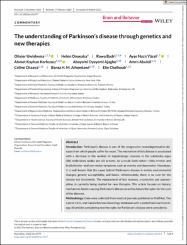| dc.contributor.author | Uwishema, Olivier | |
| dc.contributor.author | Onyeaka, Helen | |
| dc.contributor.author | Badri, Rawa | |
| dc.contributor.author | Yücel, Ayşe Nazlı | |
| dc.contributor.author | Korkusuz, Ahmet Kayhan | |
| dc.contributor.author | Ajagbe, Abayomi Oyeyemi | |
| dc.contributor.author | Abuleil, Amro | |
| dc.contributor.author | Chaaya, Celine | |
| dc.contributor.author | Alhendawi, Baraa H. M. | |
| dc.contributor.author | Chalhoub, Elie | |
| dc.date.accessioned | 2022-12-08T07:26:20Z | |
| dc.date.available | 2022-12-08T07:26:20Z | |
| dc.date.issued | 2022 | en_US |
| dc.identifier.citation | Uwishema, O., Onyeaka, H., Badri, R., Yücel, A. N., Korkusuz, A. K., Ajagbe, A. O. ... Chalhoub, E. (2022). The understanding of Parkinson's disease through genetics and new therapies. Brain and Behavior, 12(5). https://doi.org/10.1002/brb3.2577 | en_US |
| dc.identifier.issn | 2162-3279 | |
| dc.identifier.uri | https://doi.org/10.1002/brb3.2577 | |
| dc.identifier.uri | https://hdl.handle.net/20.500.12511/10088 | |
| dc.description.abstract | Introduction: Parkinson's disease is one of the progressive neurodegenerative diseases from which people suffer for years. The mechanism of this disease is associated with a decrease in the number of dopaminergic neurons in the substantia nigra (SN) while Lewy bodies are still present. As a result, both motor-ridity, tremor, and bradykinesia-and non-motor symptoms such as anxiety and depression. Nowadays, it is well known that the cause behind Parkinson's disease is mainly environmental changes, genetic susceptibility, and toxins. Unfortunately, there is no cure for the disease but treatments. The replacement of lost neurons, alpha-synuclein and apomorphine, is currently being studied for new therapies. This article focuses on history, mechanism, factors causing Parkinson's disease as well as future therapies for the cure of the diseases.
Methodology: Data were collected from medical journals published on PubMed, The Lancet, Cells, and Nature Reviews Neurology databases with a predefined search strategy. All articles considering new therapies for Parkinson's disease were considered.
Results: The pathophysiology of Parkinson's disease is currently reasonably understood. However, there is no definitive cure so all the treatments focus mainly on reducing or limiting the symptoms. Current treatment studies focus on genetics, replacing lost neurons, alpha-synuclein and apomorphine.
Conclusion: Parkinson's disease is the most common movement disorder worldwide because of the loss of dopaminergic neurons in the substantia nigra. Its symptoms include motor dysfunctions such as rigidity, tremor, and bradykinesia and non-motor dysfunctions such as anxiety and depression. Through genetics, environmental changes and toxins analysis, it is now known that future new therapies are working on replacing lost neurons, alpha-synuclein and apomorphine. | en_US |
| dc.language.iso | eng | en_US |
| dc.publisher | Wiley | en_US |
| dc.rights | info:eu-repo/semantics/openAccess | en_US |
| dc.rights | Attribution 4.0 International | * |
| dc.rights.uri | https://creativecommons.org/licenses/by/4.0/ | * |
| dc.subject | Genetic | en_US |
| dc.subject | Parkinson’s Disease | en_US |
| dc.subject | PD | en_US |
| dc.subject | Therapy | en_US |
| dc.title | The understanding of Parkinson's disease through genetics and new therapies | en_US |
| dc.type | editorial | en_US |
| dc.relation.ispartof | Brain and Behavior | en_US |
| dc.department | İstanbul Medipol Üniversitesi, Tıp Fakültesi, Dahili Tıp Bilimleri Bölümü, Tıbbi Genetik Ana Bilim Dalı | en_US |
| dc.department | İstanbul Medipol Üniversitesi, Rektörlük, Rejeneratif ve Restoratif Tıp Araştırmaları Merkezi (REMER) | en_US |
| dc.authorid | 0000-0003-3886-2151 | en_US |
| dc.identifier.volume | 12 | en_US |
| dc.identifier.issue | 5 | en_US |
| dc.relation.publicationcategory | Diğer | en_US |
| dc.identifier.doi | 10.1002/brb3.2577 | en_US |
| dc.institutionauthor | Korkusuz, Ahmet Kayhan | |
| dc.identifier.wosquality | Q2 | en_US |
| dc.identifier.wos | 000784399600001 | en_US |
| dc.identifier.scopus | 2-s2.0-85128510065 | en_US |
| dc.identifier.pmid | 35451243 | en_US |
| dc.identifier.scopusquality | Q2 | en_US |



















